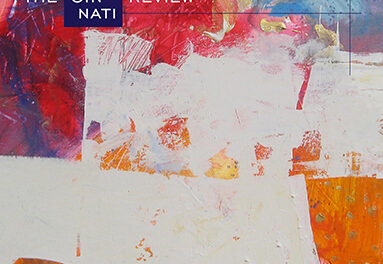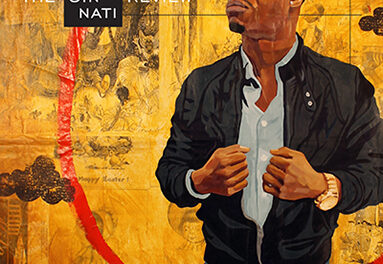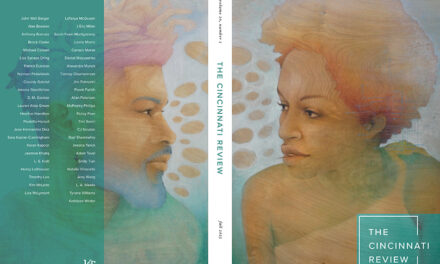On Christmas we wake up Puerto Rican. That’s when our grandmother stops pretending that hers is our only blood and lets our grandfather’s bleed back in. She stands at the feet of our beds and pulls on our blanketed toes. “Wake up, you two,” she says, holding up an album cover. “Merry Christmas.”
All year long she hides the José Feliciano album from us, but like magic, it appears on Christmas morning. While all the other families in our building are listening to Nat King Cole, Donny Hathaway, and the Temptations, we jam to a Puerto Rican guitarist.
Bodies warm from our beds, hair mussed from our pillows, and eyes phlegmy from our good deep sleeps, we follow our grandmother down the hall. As we stumble along in our footed G.I. Joe and She-Ra pajamas, she leads us into the living room and straight to the record player on the end table. She lifts the dust cover, slides the record from its sleeve, sets it on the turntable, and lowers the needle. “Knock yourselves out,” she says, abandoning us for the kitchen.
This is her only present to us. Today she doesn’t mind that we are not just hers but our grandfather’s as well. Today we’re allowed to be not only African American but also Puerto Rican, to be all the parts of ourselves. Today we can play our record as many times as we want, as loud as we like, until our mother comes home, dead tired from her overtime shift. When she gets here, we’ll tear bows and shiny wrapping paper off the Jem, Voltron, Transformers, and Teddy Ruxpin toys we asked for. Then she’ll stagger off to bed and we’ll have to keep quiet. For now, we’re allowed to play our music and make noise.
We want just this one thing for Christmas—to play this record that draws us closer to our grandfather. He left New York for Puerto Rico when his kids were little, before we grandkids ever existed. He’s never been back to Brooklyn to see us. He’s a ghost of a man, flimsier than the tinsel we drape from the artificial branches of our artificial tree, a shining sliver of a thin, thin thread. This record is as close to him as we can get, a tether to pull him near. We can’t compete with an island and we are not Christmas-card cute. We’re rough from playing in the streets, strong and wiry from swinging on monkey bars and climbing the stone animals in the courtyard of our housing projects, nimble from setting off roman candles, jumping jacks, moon whistlers, and skyrockets fast enough that our fingers don’t get scorched. Our knees are skinned from playing skelly and shooting marbles, our elbows and arms scabbed from fighting like we mean it. We’re nothing to write home about, yet our mother writes to her father several times a year, sending letters across the ocean to update him on our progress, mailing him school pictures so he can see us for himself. We never hear back. We’ve long since stopped hoping for visits, for birthday or Christmas cards. A simple phone call on a day like today would do. We’d love to hear his voice.
Instead we hear the cuatro, the güiro, the guitar, the horns, and the cheerful holiday wishes of a blind musician. For years we will believe that every singer wearing sunglasses—Héctor Lavoe, Bobby Womack, Stevie Wonder, Ray Charles, Isaac Hayes—is blind. No one will ever tell us different. We play the record and sing along to a song whose words we do not understand. If he were here, our grandfather could translate. If he were here, our grandfather could love us. Without him we have to make do. We make up the words as we go, singing what we think we hear:
Felice la di da
Police la di da
Fleece na vee dah
Potato I know
blah blah blah blah
We sing louder and louder until our grandmother yells from the kitchen that we are giving her a headache. And still we don’t stop.
We’re as happy as a song can make us. We sing with gusto, with all the joy the horns can blare. Our bodies help us to keep time. We strum our stomachs in tune with the guitar and scratch our forearms to the rhythm of the güiro. We turn empty paper-towel rolls into horns and blow, tooting along with the song. We clasp hands and swing each other round. We’re not afraid of looking foolish. No one’s watching us.
We belt out, “I wanna wish you a merry Christmas from the bottom of my heart!” and dance around the living room to wish our furniture well. We sing and circle the living room with our arms flung wide. We fling love from our hearts to the corner of the room where our tree stands, dripping garland and tinsel and shatterproof balls, multicolored electric lights blinking back at us in response. We let everything present—the stereo sound system, the love seat and sofa, the coffee and end tables—know how much we love it. We love the flattened arms of our couches, the dust in the corners, all the loose straw from our broom, even the gouges on the floor from moving the couch and tables out of the way—yes, we love it all.
. . .











